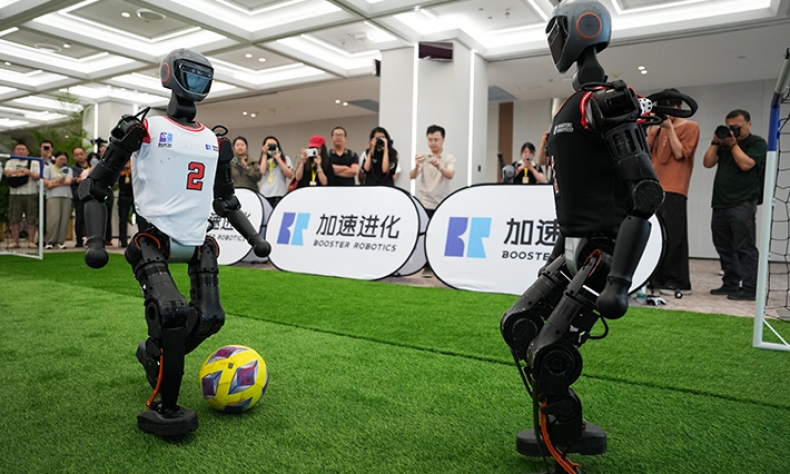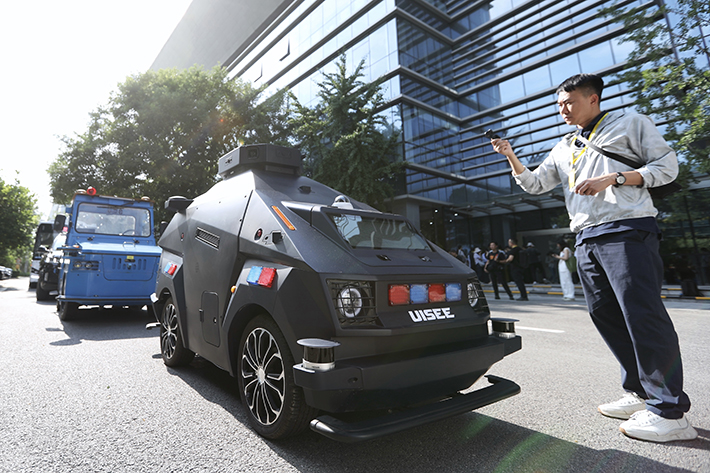A Hotbed of Idea

Beijing will continue to deepen international cooperation and strengthen dialogue on AI security to become a global innovation hub.
Autonomous buses gliding through the streets, satellites with flexible solar wings whizzing through space, smart electric vehicle factories running at full speed … In recent years, Beijing has seen the emergence of a large number of cutting-edge technology companies, confirming the city’s role as a melting pot of scientific innovation in China.
On 12 June, Startup Genome, the world-leading innovation ecosystem development organisation, released its Global Startup Ecosystem Report 2025, with Beijing moving up three places to fifth place, tied with Boston, making it the only Chinese city to feature in the global top five. This ranking recognises the convergence between proactive public support, academic excellence and financial dynamism that is conducive to the rise of new global leaders.
Strong policy support
The report highlights the strength of Beijing’s innovation base, which has developed into a major technology centre, particularly thanks to strong strategic support from public authorities.
In 2016, when Google and Uber were competing in the field of autonomous driving and Tesla launched its Autopilot system, 40-year-old Wu Gansha seized the opportunity and founded the start-up company UISEE. “Right from the start, we had our sights set on an L4 autonomous driving system,” he told ChinAfrica. Two years later, the company made the strategic decision to give up vehicle production and focus on research and development. Nine years after its founding, UISEE has evolved into a true “intelligent driver” serving a variety of industries.
UISEE’s safe and versatile autonomous system L4 combines artificial intelligence (AI) with a variety of application scenarios. More than 1,000 vehicles have already travelled more than 5.8 million km without human intervention, with applications as far afield as Singapore and the Middle East. UISEE was notably involved in the creation of the world’s first fully autonomous smart airport in Hong Kong, covering the entire innovation chain.

This rise would not have been possible without active policy support. The Beijing municipal government has established mechanisms to stimulate breakthrough innovation, address strategic technological challenges, and promote a triptych-based cooperation model: Enterprises identify needs; the government provides platforms; and talents respond to demands.
Wu recalled the difficulties encountered during the pandemic. However, during this period, the company also won funding under a support programme offered by the Ministry of Industry and Information Technology, allowing it to continue its research and development work. With the support of Beijing Municipal Science and Technology Commission and the Administrative Commission of Zhongguancun Science Park, UISEE was able to overcome technical obstacles and expand its applications. “In Beijing, public support is targeted and professional, covering the entire value chain: recruitment, research, industrialisation and international expansion. This gives us confidence in the future of autonomous driving,” he explained.
UISEE has also been included in the city’s catalogue of major original equipment manufacturers. “Initially, the costs of new technologies are high. But thanks to subsidies for end users and adequate insurance, Beijing has been able to remove the barriers to entry,” said Wu. To date, the city has recognised 297 first-generation devices in fields as diverse as health care, robotics and aerospace. Targeted events have facilitated their commercialisation.
UISEE is just one example of the many start-ups that have chosen Beijing for their development. Why is Beijing so attractive? In August 2024, the city government announced its goal of establishing more than 10,000 innovative companies, promoting innovation and expanding opportunities in high-tech sectors. A fund worth 125 million yuan ($17 million) was mobilised to support the digital modernisation of more than 550 companies.
In the field of digital infrastructure, Beijing used the China Artificial Intelligence Conference 2024 to launch an innovative consortium focusing on “ultra-node” computing clusters, bringing together public and private players to push the boundaries of large-scale AI models. In November 2024, China Unicom Beijing and Huawei inaugurated the world’s first 5G-A intelligent network, enhancing communication capabilities for cutting-edge research.
Sharing resources
According to the report, there are 46 listed AI companies in Beijing with a total capitalisation of nearly 4.3 trillion yuan ($591 billion).
The city is accelerating its metamorphosis into the open source capital of the world, fuelled by a fast-growing ecosystem in fields such as robotics and neuroscience. Beijing is home to more than 2,400 companies specialising in AI, a key sector worth nearly 350 billion yuan ($49 billion), half the national total. With 132 registered AI models, Beijing also holds a national record.
In the field of general AI, the Beijing Academy of Artificial Intelligence (BAAI) has ushered in a new era with its WuDao model series. In March 2021, WuDao 1.0 filled a gap in the Chinese ecosystem of large, pre-trained models. Three months later, WuDao 2.0 became the largest model in the world with 1,750 billion parameters. In 2023, WuDao 3.0, now fully open source, broke new ground in general image processing and multimodal processing.

Han Jian, director of the Information Technology Bureau of Beijing Municipal Science and Technology Commission and the Administrative Commission of Zhongguancun Science Park, pointed out that Beijing is home to more than 40 percent of China’s AI talents, 21 national key labs and 23 municipal labs dedicated to AI.
At a strategic level, a three-year plan for the development of embodied intelligence has been launched, coupled with initiatives to integrate AI into the cultural industry and an “AI + new materials” programme aimed at expanding technological application areas.
“AI is not a privilege reserved only for industrialised or emerging countries. Its development must remain inclusive,” Han told ChinAfrica. Beijing is actively implementing the Global AI Governance Initiative proposed by China to promote equitable and shared development.
From 12 to 17 May, the second International AI Capacity Building Workshop brought together 37 representatives from 34 developing countries, including Egypt and Zambia, to discuss concrete applications in the fields of education, health and mobility.
On 6 and 7 June, the BAAI Conference 2025 was a resounding success with over 8,000 participants on site and more than 2 million online viewers.
“Beijing will continue to deepen international cooperation and strengthen dialogue on AI security to become a global innovation hub,” Han added. The regular hosting of major technology events is proof of this.
 Facebook
Facebook
 Twitter
Twitter
 Linkedin
Linkedin
 Google +
Google +










